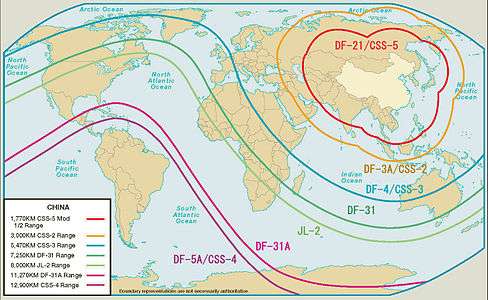JL-2
| Julang-2 (JL-2) | |
|---|---|
|
A JL-2 launch. | |
| Type | SLBM |
| Place of origin | People's Republic of China |
| Service history | |
| In service | Active as of 2015[1] |
| Used by | People's Liberation Army Navy |
| Specifications | |
| Weight | 42,000 kilograms (93,000 lb)[2] |
| Length | 13 metres (43 ft)[2] |
| Warhead | 1 or 3-4 MIRV nuclear warheads[3][4][5] |
| Blast yield | 90 kt (MIRV) or 250-1000kt (single)[4][5] |
|
| |
| Propellant | Solid[3][4] |
Operational range | 7400[6]-8000[5] km (estimated) |
Guidance system | Astro-inertial[4] with Beidou[2] |
Launch platform | Type 094 submarine[3][4] |

The JL-2 (Chinese: 巨浪-2; pinyin: Jù Làng-2; literally: "Giant Wave 2", NATO reporting name CSS-NX-14[3]) is a Chinese second-generation intercontinental-range submarine-launched ballistic missile (SLBM) slated for deployment aboard the People's Liberation Army Navy's Type 094 submarine. It succeeds the JL-1 SLBM deployed on the Type 092 submarine.
Development
The JL-2 is a naval variant of the land-based DF-31.[5][7] Their common 2-metre diameter solid fuel rocket motor was successfully tested in late-1983,[5] and research and development efforts were reorganized starting in 1985 to produce both missiles.[7]
The first JL-2 at-sea launch occurred in 2001 from a Type 031 submarine.[5][7] The program was delayed after a failed test in 2004.[5] Successful launches occurred in 2005 and 2008. The missile was successfully fired from a Type 094 submarine, the intended operational platform, for the first time in 2009.[5] A series of test launches occurred in 2012.[6][8] Another test launch occurred in January 2015.[9]
During the development of the missile, it was reported that China was considering modifying the missile to accommodate an anti-satellite warhead to give it a sea-based anti-satellite capability.[10]
According to latest source, 094 SSBN armed with JL-2 missiles began deterrent patrol in 2015.[1] The United States Department of Defense believes the missile will give the PLA Navy "its first credible sea-based nuclear deterrent."[11]
Description
The JL-2 is a three-stage, solid-fuelled missile.[3][4] Range estimates have included 7,400 km (4,600 mi)[6] to 8,000 km (5,000 mi).[5] Payload is a single[3] 250–1000 kt warhead;[4] or 3 to 4 (MIRV) 90 kt warheads,[5]
Notes and references
- 1 2 Fisher, Richard D., Jr. (16 December 2015). "China advances sea- and land-based nuclear deterrent capabilities". Jane's Defence Weekly. Surrey, UK: Jane's Information Group. 53 (6). ISSN 0265-3818.
- 1 2 3 http://missilethreat.csis.org/missile/ju-lang-2-jl-2/ CSIS Missile Threat - JL-2
- 1 2 3 4 5 6 National Air and Space Intelligence Center (2013). Ballistic & Cruise Missile Threat (PDF) (Report). p. 25. Retrieved 26 January 2015.
- 1 2 3 4 5 6 7 Rahmat, Ridzwan (25 March 2014). "PACOM chief says China will deploy long-range nuclear missiles on subs this year". janes.com. Retrieved 26 January 2015.
- 1 2 3 4 5 6 7 8 9 10 "JL-2 (CSS-NX-14)". Globalsecurity.org. 20 April 2014. Retrieved 26 January 2015.
- 1 2 3 United States Department of Defense (May 2013). Annual Report To Congress: Military and Security Developments Involving the People’s Republic of China 2013 (PDF) (Report). p. 31. Retrieved 24 January 2015.
- 1 2 3 Lewis, Jeffrey (25 June 2005). "JL-2 SLBM Flight Test". armscontrolwonk.com. Retrieved 26 January 2015.
- ↑ Gertz, Bill (21 August 2012). "Ready To Launch: China conducts rare flight test of new submarine-launched missile". The Washington Free Beacon. Retrieved 15 January 2013.
- ↑ Gertz, Bill (18 February 2015). "China conducts JL-2 sub missile test". The Washington Times. Retrieved 10 March 2015.
- ↑ Gertz, Bill (18 January 2008). "Submarine ASAT". Washington Post. Retrieved 18 May 2015 – via HighBeam Research. (subscription required (help)).
- ↑ Taylor, Marcus; Tamerlani, Eric; Farnsworth, Timothy (June 2013). "Pentagon Sees China Progressing on SLBM". Arms Control Today. Arms Control Association. 43 (5): 31–32. JSTOR 23629520. (subscription required (help)).
External links
- CSIS Missile Threat - Ju Lang-2
- JL-2 from Mark Wade's Encyclopedia Astronautica
